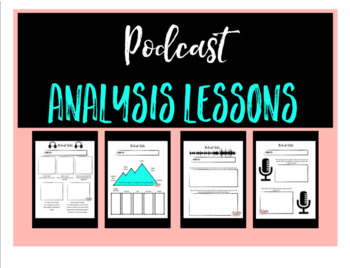How Do You Analyse a Podcast?
To analyze a podcast, assess its content, audio quality, and engagement with the audience. Consider the format, delivery, and listener feedback.
Podcasts are a popular form of entertainment and information, attracting a diverse audience. Analyzing a podcast can provide valuable insights to improve content and engage with listeners effectively. By evaluating various aspects such as content relevance, listener engagement, and audio quality, podcast creators can identify strengths and areas for improvement.
This analysis can help in refining the podcast’s format, identifying the target audience, and addressing their needs and preferences. Additionally, understanding listener feedback and engagement can aid in building a loyal listener base and expanding the podcast’s reach. Analyzing a podcast helps creators in delivering meaningful and engaging content while continuously improving the overall listening experience.

Credit: www.analyse.asia
Choosing A Podcast
Analyzing a podcast can be done by considering its content quality, host expertise, guest relevance, and listener engagement. Evaluate the topics covered, research the host and guests, and determine if the audience is actively participating through reviews and ratings. A well-analyzed podcast can provide valuable insights and an enjoyable listening experience.
Relevance Of The Topic
When it comes to choosing a podcast, one of the most important factors to consider is the relevance of the topic. It’s crucial to select a podcast that aligns with your interests, goals, or industry, as it increases the chances of gaining valuable insights and staying engaged.
Here are a few things to keep in mind:
- Identify your areas of interest and the topics you want to learn more about.
- Look for podcasts that cover those topics, ensuring the content is up-to-date and valuable.
- Consider the podcast’s format, such as solo episodes, interviews, or panel discussions, and choose the one that resonates with your preferred learning style.
Quality Of The Content
Another important aspect to analyze when choosing a podcast is the quality of the content. While there are thousands of podcasts out there, not all of them deliver valuable and reliable information. By considering the quality, you can ensure that your time spent listening is worthwhile.
Here are a few tips to assess the content quality:
- Check for credibility: Research the host and guests to see if they are experts or have relevant experience in the topic being discussed.
- Read reviews and ratings: See what other listeners are saying about the podcast to gauge its overall quality and reputation.
- Listen to a sample episode: Some podcasts release short introductory episodes or clips, allowing you to get a feel for the host’s style, the sound quality, and the overall production value.
- Ensure accuracy and depth: Evaluate the podcast’s content by assessing if it provides accurate information backed by facts, research, or expert opinions. Additionally, consider the depth of coverage given to the topic.
Listening And Note-taking
When it comes to analyzing a podcast, effective listening and note-taking play a crucial role in extracting valuable information. Active listening and the ability to identify key ideas are fundamental skills required for comprehending and analyzing podcast content. Let’s delve into how these practices can enhance the process of podcast analysis.
Active Listening
Active listening involves fully concentrating, understanding, responding, and remembering the content being presented. It is important to listen attentively and actively engage with the discussions in the podcast. By immersing ourselves in the content, we can better comprehend the information and context. This approach allows us to pick up on tone, inflection, and emotion, aiding in a more thorough analysis of the podcast.
Identifying Key Ideas
Identifying key ideas necessitates extracting the core concepts and essential messages conveyed within a podcast episode. It involves recognizing recurring themes, critical arguments, or any overarching narrative. By extracting and noting down these key ideas, one can gain a deeper understanding of the podcast’s content and make connections between different segments.
Evaluating The Host And Speakers
When evaluating a podcast, one of the crucial aspects to consider is the expertise and credibility of the host and speakers. The ability of the host and speakers to communicate effectively and deliver valuable content plays a significant role in the overall quality of a podcast. Let’s delve into the key factors to consider when assessing the host and speakers of a podcast.
Expertise And Credibility
The expertise and credibility of the host and speakers are essential in determining the value of the podcast content. Listeners seek information from knowledgeable and trustworthy individuals who can provide reliable insights.
Delivery And Communication Skills
Effective delivery and communication skills are vital in engaging the audience and conveying the intended message. The ability of the host and speakers to articulate their thoughts clearly and engage the listeners can greatly impact the overall listening experience.

Credit: www.reddit.com
Assessing Production Value
Production value plays a significant role in the overall quality of a podcast. To ensure its success, it is crucial to analyze the podcast’s production value thoroughly. In this section, we will explore the key aspects to consider when assessing the production value of a podcast.
Sound Quality
Sound quality is paramount when it comes to providing an enjoyable listening experience. Poor sound quality can drive away potential listeners and hinder the impact of the podcast’s content. It is essential to assess the podcast’s sound quality by considering the following factors:
- Ensure that the audio levels are consistent throughout the podcast to avoid jarring transitions.
- Check for background noise, such as echo or static, which can distract listeners.
- Evaluate the clarity of the voices and ensure they are crisp and easy to understand.
- Verify that the podcast is free from background interruptions like clicks or bumps.
By paying close attention to these sound quality aspects, you can provide a seamless auditory experience to your podcast audience.
Editing And Transitions
The editing and transitions in a podcast play a crucial role in maintaining a cohesive flow of the content. Smooth transitions between segments and well-executed editing help keep the listeners engaged. Here are some key factors to consider when assessing the editing and transitions:
- Evaluate how well different segments are connected and if the transitions feel seamless.
- Check for any abrupt cuts, awkward pauses, or tangents that disrupt the flow of the podcast.
- Assess the pacing of the podcast to ensure that it is neither too fast nor too slow.
- Look for any repetition of information or excessive editing that may confuse the listeners.
By analyzing the editing and transitions critically, you can enhance the overall listening experience and maintain the audience’s interest throughout the podcast.
Collecting And Analyzing Data
Analyzing a podcast involves a crucial step: collecting and analyzing data. By gathering and examining data, podcasters gain valuable insights into their audience, content performance, and areas for improvement. Through the two types of data measurements, quantitative and qualitative, podcasters can make informed decisions for content optimization and audience engagement. So, let’s delve deeper into these two types of data analysis: Quantitative Data and Qualitative Data.
Quantitative Data
Quantitative data provides measurable metrics for assessing the podcast’s performance. These metrics offer a statistical overview of various aspects such as audience reach, listener demographics, and episode download numbers. Here are a few key quantitative metrics to consider when analyzing a podcast:
- Episode Downloads: The number of times an episode is downloaded provides insights into its popularity and audience engagement.
- Listener Demographics: Understanding the demographic profile of podcast listeners helps tailor content to their preferences and needs.
- Listening Duration: Examining how much of an episode listeners consume allows podcasters to identify engaging content and areas for improvement.
- Referral Sources: Tracking the sources that drive listeners to a podcast, such as social media, websites, or other podcasts, reveals the effectiveness of marketing efforts.
By analyzing and interpreting this quantitative data, podcasters can gain a clear understanding of their podcast’s performance and make data-driven decisions to enhance their content strategy.
Qualitative Data
Qualitative data offers insights into the subjective experiences and opinions of podcast listeners. It focuses on understanding the listener’s emotions, preferences, and feedback. Here are a few methods for collecting qualitative data:
- Listener Surveys: Conducting surveys allows podcasters to gather direct feedback and opinions from listeners, enabling them to make improvements based on the audience’s preferences.
- Reviews and Ratings: Monitoring reviews and ratings on podcast platforms provides an understanding of listener sentiments towards the show and specific episodes.
- Listener Interviews: Engaging in conversations with listeners through interviews helps gain deeper insights into their motivations, interests, and expectations.
- Episode Transcripts: Analyzing episode transcripts can uncover keywords and topics that resonate with listeners, informing future content creation.
By collecting and analyzing qualitative data, podcasters can uncover nuanced insights that complement the quantitative metrics. This comprehensive understanding of the audience helps ensure content resonates with their preferences and helps build a loyal listener base.

Credit: www.teacherspayteachers.com
Frequently Asked Questions For How Do You Analyse A Podcast?
How Do You Analyze A Podcast?
Analyzing a podcast involves evaluating its content, structure, audience engagement, audio quality, and key metrics.
Why Is It Important To Analyze A Podcast?
Analyzing a podcast helps identify areas for improvement, understand audience preferences, and measure the effectiveness of marketing efforts.
What Tools Can Be Used To Analyze A Podcast?
Various tools such as podcast analytics platforms, social media monitoring tools, and website analytics can be used for podcast analysis.
What Are The Key Metrics To Consider When Analyzing A Podcast?
Important metrics to analyze include total downloads, listener retention, average listening time, demographic information, and listener feedback.
Conclusion
Understanding how to analyze a podcast is crucial for podcast creators and enthusiasts alike. By applying effective analysis techniques, you can gain valuable insights into the success and impact of your podcast. This includes evaluating engagement metrics, listener feedback, and market trends.
Remember to optimize your podcast for search engines, ensuring it reaches a wider audience. Utilizing these strategies will enable you to continuously improve your podcast and connect with your target audience effectively. Don’t miss out on the opportunity to take your podcast to new heights!





